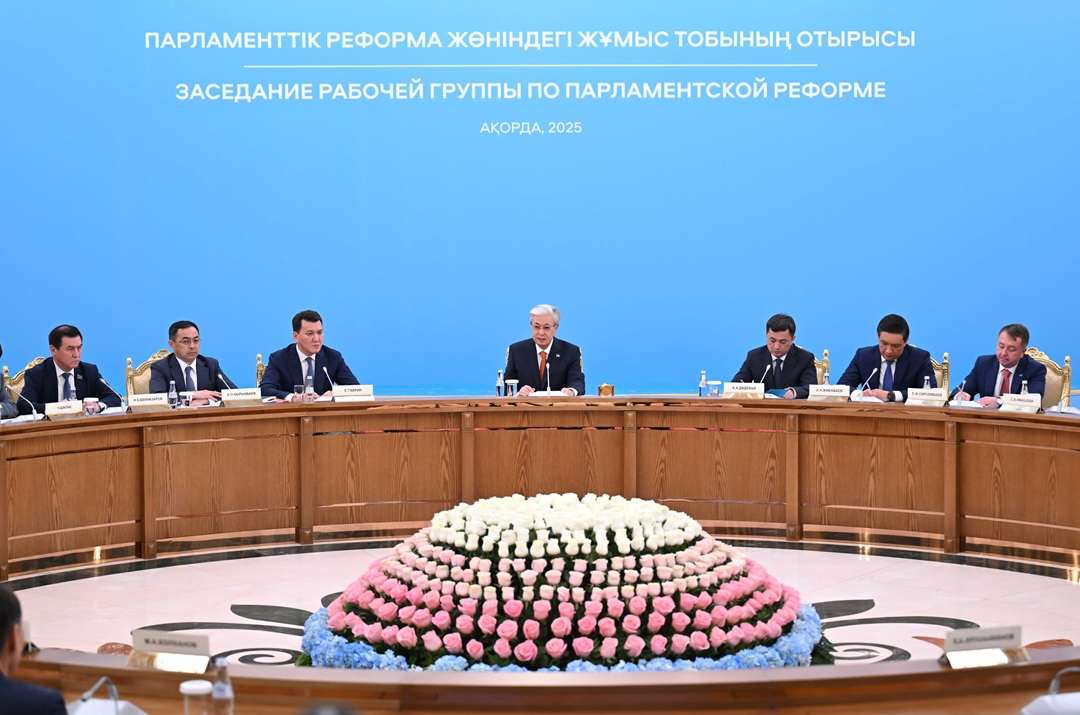
President Kassym-Jomart Tokayev has described Kazakhstan’s upcoming transition to a unicameral Parliament as one of the most consequential reforms in the nation’s modern history, underscoring both its complexity and significance during the inaugural meeting of the newly established working group on parliamentary reform.
The reform, first announced in Tokayev’s September state-of-the-nation address, represents the next stage of the country’s political modernisation drive. While the presidential system will remain central, Tokayev argued that consolidating Parliament into a single chamber aligns with both domestic political logic and global practice, noting that two-thirds of the world’s countries function under similar systems.
“Parliamentary reform is an exceptionally important and challenging task facing our country. It directly affects the fate of the nation and our people,” Tokayev told the meeting.
The President stressed that the process cannot be rushed. Nearly 40 articles of Kazakhstan’s Constitution will need to be amended, alongside more than 60 laws and codes. “This is a process comparable to adopting a new Constitution,” he cautioned, highlighting the depth of the institutional changes involved.
Tokayev emphasized that the reform must be broadly debated and carefully prepared, with the working group including representatives of Parliament, the Presidential Administration, the government, political parties, the legal community, academia, and civil society. “All reforms must be carried out in an evolutionary manner, taking into account citizens’ current demands, national specificities, and the country’s fundamental interests,” he said.
The working group will be tasked with shaping the conceptual framework of the reform, soliciting proposals from citizens through the e-Otinish and e-Gov platforms, and reviewing the impact on constitutional, legal, and electoral processes.
“All proposals submitted through the e-Otinish and e-Gov platforms must be analysed thoroughly. As a just state, we must consider every citizen’s suggestion that contributes to the common good,” Tokayev insisted.
While media coverage has often focused on the dissolution of the Senate, Tokayev argued that the changes go much further, amounting to a transformation of the entire representative branch of government.
The shift would see all deputies (MPs) elected via party lists, a model Tokayev said would strengthen professionalism and responsibility in lawmaking. “The professionalism of deputies will be the key factor in the success of this reform. Forming Parliament through party lists will help ensure a competent and qualified composition,” he noted. He added that a competitive multi-party system within a unicameral structure would encourage constructive dialogue where “responsibility and expertise prevail over populism.”
Tokayev placed the reform within the wider context of Kazakhstan’s modernization, which combines economic and social changes with rapid technological innovation. He highlighted the government’s commitment to creating an e-Parliament, a digital legislative platform designed to streamline decision-making and expand avenues for citizen participation.
“Particular attention is given to digitalisation and the introduction of artificial intelligence, which will transform public administration systems worldwide,” Tokayev said. The move toward a unicameral Parliament, he added, would help Kazakhstan adapt to the accelerated pace of decision-making while maintaining the quality of legislation.
The President reiterated that the reform is not a short-term project. Constitutional amendments of this magnitude will require lengthy deliberations, followed by a nationwide referendum, which Tokayev has previously signalled could take place in 2027. Between now and then, public hearings, expert consultations, and parliamentary debates are expected to shape the final design.
International observers note that while the reform is framed as a step toward efficiency and modernisation, its political impact could be profound. Supporters argue it will cut duplication, lower costs, and align Kazakhstan with the parliamentary models used in most democracies worldwide.
Concluding his address, Tokayev urged members of the working group to treat their task with the utmost seriousness. “Parliamentary reform is closely linked to broader changes taking place in the country: economic, social, and technological,” he said. “This is a profound transformation of our representative institutions. The responsibility on your shoulders is immense.”
The working group, which includes lawmakers, ministers, legal scholars, party representatives, and civil society figures, will hold regular sessions to draft proposals and assess public input. Its recommendations will form the basis of constitutional amendments to be debated in the coming years.





























